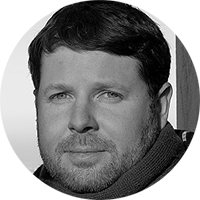Registration REQUIRED by 4pm on April 21, 2025 in order to attend this event.
Please join the Harriman Institute for a lecture by Ilya Kalinin. Moderated by Mark Lipovetsky.
Boris Groys was the first scholar to envision Moscow conceptualism through the ritual categories of the sacred and the profane (Groys B., Moscow Romantic Conceptualism, 1979). The difficulty arises when the intermediate, liminal phase of the transitional rite, working as a critical parodic tool that makes is possible to problematize grammar and vocabulary of the previous historical epoch, acquires a value in itself. In this case, the dialectic of destruction and reproduction acquires a bad infinity, in which the critical revision of the opposing or previous language turns into a parasitic exploitation, making criticism dependent on what it seeks to expose. According to this logic, the final positive appropriation of the Soviet past, which occurred in the mid-2000s, was predetermined by the type of criticism that began to dominate in the late 1980s, but was rooted in the stylistic and ideological techniques of Sots Art, Conceptualism, and everyday poetics of стёб. Naturally, this is not about imputing blame for the current national-patriotic consensus to Komar and Melamid, Bulatov or Prigov. The point is that the criticism of the Soviet, characteristic of the late Soviet era, turned out not to be very productive but on the contrary, only contributed to its partial return. Looking at the poetics of the “Nostalgic Socialist Realism” series (early 1980s) by Komar and Melamid in a retrospective of “Old Songs About the Most Important” (1996), one can see how critical deconstruction paves the way for subsequent positive construction. Similarly, Bruskin’s “Fundamental Lexicon” (1986) seems to have already cleared the original ideological context and aesthetically mythologized the vocabulary of Soviet culture, preparing it for future patriotic re-actualization.
Kalinin’s presentation is intended to focus on the analysis of Perestroika’s critical language, based on the deconstruction of official Soviet discourse. The material for analysis will be both non-conformist art of the 1980s and a number of movies of the 1980-1990s.
 Ilya Kalinin is Einstein Visiting Researcher at Humboldt Universität zu Berlin. He got his PhD at Saint Petersburg State University (the title of his thesis was “Russian Literary Utopia, XVIII-XX Centuries: The Philosophy and Poetics of the Genre.” (2002). By 2022 he was a professor at the Department of Liberal Arts and Sciences (Smolny College), Saint Petersburg State University; and at the National Research University “Higher School of Economics” (Saint-Petersburg). His recent researches focus on Russian Literature, early Soviet intellectual and cultural history, and on the historical and cultural politics of post-Soviet Russia. He is an author of more than 200 academic articles and public essays which have been translated into 15 languages.
Ilya Kalinin is Einstein Visiting Researcher at Humboldt Universität zu Berlin. He got his PhD at Saint Petersburg State University (the title of his thesis was “Russian Literary Utopia, XVIII-XX Centuries: The Philosophy and Poetics of the Genre.” (2002). By 2022 he was a professor at the Department of Liberal Arts and Sciences (Smolny College), Saint Petersburg State University; and at the National Research University “Higher School of Economics” (Saint-Petersburg). His recent researches focus on Russian Literature, early Soviet intellectual and cultural history, and on the historical and cultural politics of post-Soviet Russia. He is an author of more than 200 academic articles and public essays which have been translated into 15 languages.
His book (in collaboration with G. Orlova and N. Nikiforova) “Soviet Energy Imagination: Electricity, Atom, Oil” was published in S.Petersburg in 2022.
- “History as Art of Articulation: Russian Formalists and Revolution.” Moscow: New Literary Observer, 2025 (in Russian) – in press.
- “Culture and Politics in Putin’s Russia.” Berlin: Suhrkamp Verlag (in German) – in press


